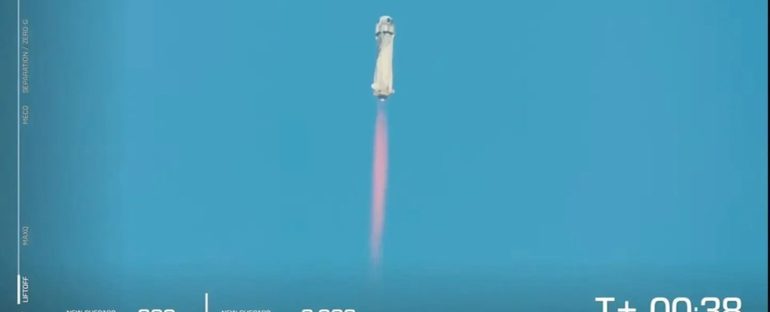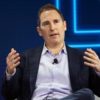Jeff Bezos just joined the very small cohort of people who have launched into space and gazed at Earth from above.
The richest man on Earth briefly left the planet early Tuesday morning aboard a New Shepard rocket designed and built by Blue Origin, the spaceflight company Bezos founded in 2000. The vehicle had flown 15 times before, but never with people on board; this was Blue Origin’s first passenger flight.
The company is hoping for many more, though – it plans to fly tourists regularly on New Shepard but has yet to open ticket sales.
Bezos flew to space alongside his brother Mark; 18-year-old Dutch high school graduate Oliver Daemen, whose father paid for the third seat; and Wally Funk, an 82-year-old aviator who trained to go to space in the 1960s but was ultimately denied the opportunity because she was a woman.
The group lifted off at 9:12 am ET from a launchpad in West Texas. The New Shepard’s engines roared to life, and the rocket heaved itself off the ground, screaming through the atmosphere for three minutes.
Bezos and his companions were pinned to their seats as the feeling of Earth’s gravity grew three times stronger than normal.
Those that went to the edge of space, from left: Oliver Daemen, Wally Funk, Jeff and Mark Bezos. (Blue Origin)
Then the rocket booster separated from the capsule, giving it a final push past the Kármán line – an imaginary boundary 100 km (62 miles) above sea level, where many experts say space begins.
Bezos and his companions had just about three minutes to float around weightless in the capsule and admire the Earth curving below before gravity began to pull them back down.
As the capsule plunged back toward the ground, a panel of heat-resistant tiles protected it as friction superheated the surrounding atmosphere.
“You have a very happy crew up here, I want you to know,” Bezos told mission controllers as they descended.
Then three parachutes ballooned overhead, slowing the capsule to a landing in the Texas desert. The rocket booster, meanwhile, returned itself to a landing pad in order to launch another day.
The entire launch and flight were autonomous – with no pilots – and lasted just 11 minutes.
“Today’s launch represents a number of firsts,” Ariane Cornell, Blue Origin’s astronaut-sales director, said during a livestream of the flight.
“The first time a privately funded spaceflight vehicle has launched private citizens to space from a private launch site and private range down here in Texas. It’s also a giant first step towards our vision to have millions of people living and working in space.”
Bezos says Blue Origin is his ‘most important work’
Bezos’s goals extend beyond flying tourists to the edge of space. He intends to use New Shepard trips to fund more ambitious projects that could pave the way for humans to establish settlements off-planet.
Blue Origin is building a larger, more powerful reusable rocket called New Glenn – after John Glenn, the first American to orbit Earth. (New Shepard is named for Alan Shepard, the first American to reach space.) New Glenn is meant to carry heavy loads into orbit around Earth or even to the Moon.
Bezos has previously called Blue Origin his “most important work.” He stepped down from his position as Amazon CEO just weeks before his launch.
“Our vision is millions of people living and working in space, and New Glenn is a very important step. It won’t be the last of course,” Bezos said in a statement to Business Insider in 2016. “Up next on our drawing board: New Armstrong. But that’s a story for the future.”
Neither Bezos nor Blue Origin have shared details about New Armstrong.
Bezos believes that in order to avoid natural limits on the human population and energy use, humanity must spread off its home planet. Otherwise, human civilization will stop growing due to resource caps.
The first step, he has said, is to make reaching space cheaper. That’s where Blue Origin’s reusable rockets come in. (Elon Musk‘s SpaceX is similarly building reusable rockets to lower the cost of reaching space.)
“I’m pursuing this work because I believe if we don’t, we will eventually end up with a civilization of stasis, which I find very demoralizing,” Bezos told Mathias Döpfner, the CEO of Axel Springer (Insider’s parent company), in 2018.
“Now take the alternative scenario, where you move out into the Solar System. The Solar System can easily support a trillion humans,” Bezos continued.
“We would have a thousand Einsteins and a thousand Mozarts and unlimited – for all practical purposes – resources and solar power and so on. That’s the world that I want my great-grandchildren’s great-grandchildren to live in.”
Richard Branson launched to space before Bezos but didn’t pass the Kármán line
Bezos is now the second person to launch aboard his own company’s commercial space vehicle. Richard Branson, who founded Virgin Galactic in 2004, completed a similar suborbital flight aboard his company’s space plane on July 11.
But Blue Origin has argued that Branson didn’t go to space, since he only flew to about 89 km above sea level and did not pass the Kármán line. However, both NASA and the Federal Aviation Administration have awarded astronaut wings to pilots who flew past 80 km.
This article was originally published by Business Insider.
More from Business Insider:



